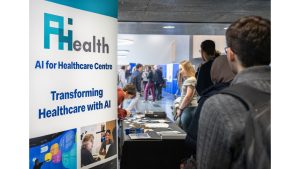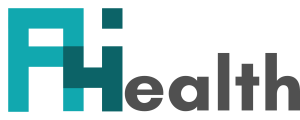 On 24th September 2025, the AI for Healthcare Centres hosted their annual Industry Day at the City and Guilds Building, Imperial College London. The event brought together leading voices from academia, industry, healthcare, and regulation to explore how artificial intelligence is shaping the future of healthcare.
On 24th September 2025, the AI for Healthcare Centres hosted their annual Industry Day at the City and Guilds Building, Imperial College London. The event brought together leading voices from academia, industry, healthcare, and regulation to explore how artificial intelligence is shaping the future of healthcare.
With a packed programme of talks and networking, chaired by Prof. Hamed Haddadi, the day highlighted both the opportunities and challenges in translating AI from research to real-world clinical impact.
AI4Health and Convergence Science
The day opened with a welcome from the AI4Health Director, Prof. Aldo Faisal, outlining the Centres’ vision to train 233 PhD students by 2032 at the interface of AI and healthcare. The introduction also emphasised convergence science – the need to bring together diverse disciplines, sectors, and stakeholders to deliver truly integrated healthcare solutions.
Key initiatives were also showcased, including the launch of Nightingale AI and pioneering work on building a complete digital twin at St Mary’s Hospital emergency department. The message was clear: meaningful change in healthcare requires not just technical innovation, but also partnerships and shared vision.
Morning Highlights: Innovation, Data, and Trust
- Sultan Haider (Siemens Healthineers) explored the success factors for innovation in healthcare, stressing that real progress begins with acquiring a mandate for change and aligning efforts around a purpose greater than profit: building a healthier society.
- Alex Zaretsky (British Standards Institute) addressed trust in AI as a medical device, underlining the importance of certification and standards beyond technical files, and the need to bridge deep tech with regulatory frameworks.
- Oracle & Lewisham Health and Care Partners shared the impact of their Did Not Attend (DNA) Risk Model, which predicts non-attendance at hospital appointments. Between March and August 2024, over 20,000 patients were contacted, reducing missed appointments and saving costs. Their case study showed how machine learning can deliver people-centred improvements in the NHS.
- Sinead O’Connor (Trinity College Dublin) provided insights into the European Health Data Space (EHDS) and its implications for AI in healthcare. She noted both the opportunities and barriers, highlighting that even patients often struggle to access their own data under current regulations. The EHDS promises a more unified framework for secondary use of health data, with potential to unlock pan-European research and innovation.
Afternoon Sessions: From Interoperability to Foundation Models
- Jeff Fried (InterSystems) described how the company manages over 1 billion patient records globally, including 60% of NHS data in the UK. He showcased how interoperability and trusted data systems are essential for scaling AI, highlighting partnerships with companies tackling neonatal sepsis and dementia through AI-driven solutions.
- Paul Comerford (Information Commissioner’s Office) spoke about data minimisation and privacy-enhancing technologies, underscoring the regulatory guardrails that must guide AI adoption.
- Dimitris Spathis (Google) discussed the potential of foundation models for personal health, and how signals from personal devices can fuel multimodal, fair, and robust AI systems.
AI in Action: From Concept to Impact
The day closed with a showcase of health-tech innovators translating AI research into practice. These examples demonstrated how cutting-edge research is already finding its way into clinics, improving efficiency and patient outcomes.
- Maria Leiloglou (Enacuity) presented on AI-driven hyperspectral imaging for minimally invasive surgery.
- Natalie Cooke (SurgeryAI) introduced her company’s mission to empower surgeons with AI tools for precision and workflow optimisation.
- Boroumand Zeidaabadi (Cardiovolt.ai) presented his company dedicated to turning everyday heart traces (ECGs) into an AI-powered early-warning risk tool that detects silent disease and predicts future health events years before symptoms emerge.
The AI4Health Industry Day 2025 reaffirmed the importance of collaboration across academia, industry, healthcare providers, and regulators. The event not only offered students and partners the opportunity to network but also showcased how the Centres act as a bridge between discovery and deployment.
This event was supported by UK Research and Innovation. UKRI Centres for Doctoral Training in AI for Healthcare grant number EP/S023283/1, UKRI AI Centre for Doctoral Training in Digital Healthcare grant number EP/Y030974/1 and The School of Human and Artificial Intelligence.

